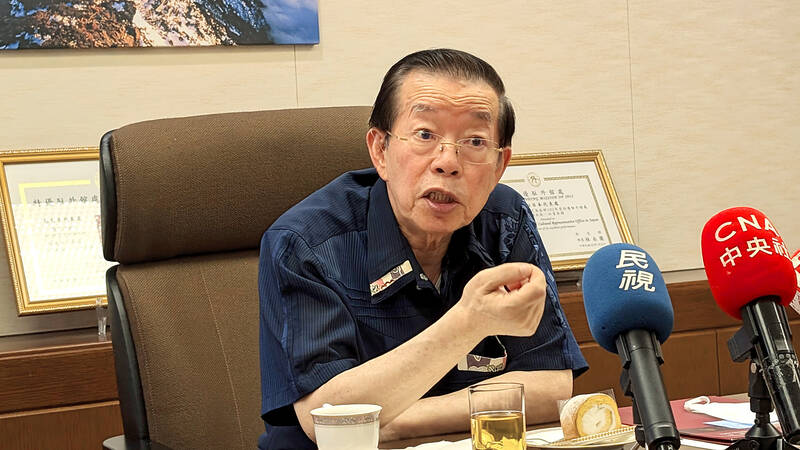Taiwan’s inclusion in Japan’s family registry system was the result of years of discreet efforts by Taiwanese diplomats and Taiwan-friendly Japanese lawmakers, former representative to Japan Frank Hsieh (謝長廷) said yesterday.
The Nikkei on Monday reported that from May, Tokyo is to allow Taiwanese married to Japanese citizens to list their place of origin as “Taiwan” in the official family record database.
Previously, applicants had to select “China.”

Photo: Lin Tsuei-yi, Taipei Times
Hsieh, who was Taiwan’s representative to Japan from 2016 to last year, said on Facebook that numerous under-the-radar efforts by Taiwanese diplomats, with assistance from Japanese lawmakers, had made the change possible.
The rule that led to Taiwanese being listed as being from China has been in place since 1964, before which the Republic of China (ROC, Taiwan) had diplomatic ties with Tokyo, Nikkei reported.
In 1972, Japan switched diplomatic recognition from the ROC to the People’s Republic of China.
The option in the family registry for Taiwanese was not changed from “China,” the newspaper reported
Hsieh said that after taking office in May 2016, he received complaints from Taiwanese living in Japan who had been forced to select “China.”
He was asked to push the Japanese government to change the rule.
Hsieh said that he had thought the arrangement was “unreasonable” and that the residence registry, a separate system, has a “Taiwan” option for nationality.
However, he was told that the only way to make the change was to amend the Japanese Family Register Act, Hsieh said.
His office believed that it was unlikely Japan’s Diet would change the law solely to cater to the needs of Taiwanese living in the country, and that any attempt to do so would lead to protests and pushback from Beijing and China-friendly Diet members.
However, two Japanese congressmen’s wives were from Taiwan while he was in office, Hsieh said.
One of the two congressmen told him that Japan was expected to amend the act to require the inclusion of phonetic readings of personal names, he said.
The congressman promised to look into the family registry issue, Hsieh said.
The congressman asked Taipei to keep the issue low-profile while he rallied support, Hsieh said.
The Ministry of Foreign Affairs on Monday thanked all those who had helped facilitate the change, which is expected to take effect on May 26.
Two Taiwanese married to Japanese said that they were excited about the change and would register as being from Taiwan as soon as possible.
According to the new rules, a Taiwanese registered as being from China would be able to change their nationality to Taiwan.
One said that although the change does not mean Japan recognizes Taiwan as a country, it is still a positive step forward.
The most important thing is that we can identify as Taiwanese and Japan understands the importance of that, she added.
The Japanese Ministry of Justice told Japanese-language media on Monday that the change is “a sign of greater consideration for identity.”
Although the Japanese government says the change is technical, it still drew a protest from Beijing.
Chinese Ministry of Foreign Affairs spokesman Guo Jiakun (郭嘉昆) on Monday said that “the question of Taiwan is purely an internal affair of China, which brooks no foreign interference.”
“We urge Japan to stop making a sideshow on the question of Taiwan and stop sending conflicting or wrong messages,” Guo was quoted as saying by an English-language Kyodo News report.

Taiwanese can file complaints with the Tourism Administration to report travel agencies if their activities caused termination of a person’s citizenship, Mainland Affairs Council Minister Chiu Chui-cheng (邱垂正) said yesterday, after a podcaster highlighted a case in which a person’s citizenship was canceled for receiving a single-use Chinese passport to enter Russia. The council is aware of incidents in which people who signed up through Chinese travel agencies for tours of Russia were told they could obtain Russian visas and fast-track border clearance, Chiu told reporters on the sidelines of an event in Taipei. However, the travel agencies actually applied

Japanese footwear brand Onitsuka Tiger today issued a public apology and said it has suspended an employee amid allegations that the staff member discriminated against a Vietnamese customer at its Taipei 101 store. Posting on the social media platform Threads yesterday, a user said that an employee at the store said that “those shoes are very expensive” when her friend, who is a migrant worker from Vietnam, asked for assistance. The employee then ignored her until she asked again, to which she replied: "We don't have a size 37." The post had amassed nearly 26,000 likes and 916 comments as of this

New measures aimed at making Taiwan more attractive to foreign professionals came into effect this month, the National Development Council said yesterday. Among the changes, international students at Taiwanese universities would be able to work in Taiwan without a work permit in the two years after they graduate, explainer materials provided by the council said. In addition, foreign nationals who graduated from one of the world’s top 200 universities within the past five years can also apply for a two-year open work permit. Previously, those graduates would have needed to apply for a work permit using point-based criteria or have a Taiwanese company

The Shilin District Prosecutors’ Office yesterday indicted two Taiwanese and issued a wanted notice for Pete Liu (劉作虎), founder of Shenzhen-based smartphone manufacturer OnePlus Technology Co (萬普拉斯科技), for allegedly contravening the Act Governing Relations Between the People of the Taiwan Area and the Mainland Area (臺灣地區與大陸地區人民關係條例) by poaching 70 engineers in Taiwan. Liu allegedly traveled to Taiwan at the end of 2014 and met with a Taiwanese man surnamed Lin (林) to discuss establishing a mobile software research and development (R&D) team in Taiwan, prosecutors said. Without approval from the government, Lin, following Liu’s instructions, recruited more than 70 software